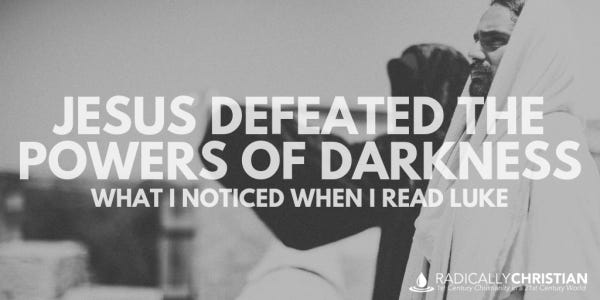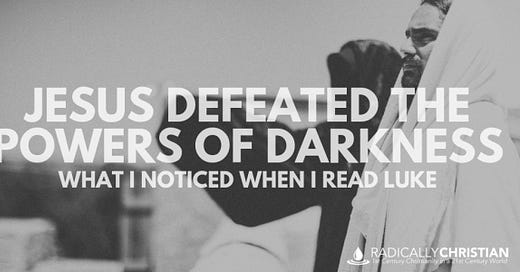Jesus Defeated the Powers of Darkness – What I Noticed When I Read Luke
I absolutely love Luke’s gospel account. Perhaps one reason I love it so much is that Luke was a traveling companion of the apostle Paul, so Paul likely had a great deal of influence on how Luke’s gospel was compiled. The themes Luke explores and highlights help us understand Paul’s epistles even better. Some of the themes in this book might even surprise you. Here are some of the things I took away from my most recent reading of Luke.

Gentiles as Children of Abraham
Like the book of Matthew, Luke’s gospel account quotes often from Israel’s scriptures and makes reference to Israel’s story. However, in Luke’s account, there is an even greater emphasis on the fact that Jesus came to rescue people of every nation. In a way, Luke takes the heavy Jewish emphasis of Matthew and the heavy Gentile emphasis of Mark and weaves them together, showing that the Messiah came to offer redemption to the Jew first and also to the Gentile.
In the very beginning of the book, Luke records the words of four different Spirit-filled people who had waited their whole lives for the Messiah. Zechariah, Mary, Simeon, and Anna all testify to the identity and the vocation of Jesus. They speak of how Jesus would:
show mercy to the offspring of Abraham
save the offspring of Abraham from their enemies
cause the fall and rising of many in Israel
relieve those who were waiting for the redemption of Jerusalem
Luke talks more about Abraham than any of the other gospel accounts. It is obvious he wants the reader to understand Jesus came to fulfill the promises God made to Abraham’s children. But to all those Jews who thought the Messiah would rescue them from the coming destruction of Jerusalem simply because they were descendants of Abraham, John the Baptist said:
“Do not begin to say to yourselves, ‘We have Abraham as our father.’ For I tell you, God is able from these stones to raise up children for Abraham.”
The Jews who rejected Jesus were cut off from the family tree of Abraham and the Gentiles who put their faith in Jesus are grafted into the family tree of Abraham. That’s the story Luke is telling. Like his friend Paul, Luke is teaching that anyone who puts their faith in Jesus can be considered Abraham’s heir.
The Poor, Hungry, and Sick
Luke emphasizes Jesus’ ministry to the poor and sick of Israel. Jesus not only ministered to the poor, but he also condemned the rich of Israel for neglecting their Jewish brethren. The reader should not think for a moment that “poor” or “sick” or “hungry” should be understood in metaphorical or symbolic terms. Jesus came to bring down the mighty from their thrones and exalt those of humble estate. He came to fill the hungry with good things and send the rich away empty. Jesus literally reduced poverty, hunger, and sickness in Israel.
But what does that mean for followers of Jesus today? First, it means we must obey the commands of our King. We must show the same kind of mercy to those in our global community as Jesus showed the people of his community. If we have food and clothing, we must share with those who do not. The kingdom of God must literally reduce poverty, hunger, and sickness in the world.
Second, Jesus was showing us what will happen “in the age to come” for all of his people.
the sick will all be healed
the dead will be raised never to die again
the hungry will all be satisfied
the poor will all be rich
Again, we come away with a very strange interpretation if we read terms like poor, hungry, and sick as metaphors or as symbolic language. Wherever the kingdom of God spreads, there should be tangible evidence and when the kingdom of God reaches its fullness, God will literally put an end to sickness, death, and poverty.
Rebuking the Powers of Darkness
Finally, there is a theme in Luke’s account that I have often overlooked. Luke reveals the fact that the evil we can see, like poverty, sickness, anger, and murder are all the result of demonic forces working behind the scenes. Throughout the book, when Jesus healed someone, he was breaking the demonic hold on that person and setting them free.
For instance, there was a woman Jesus healed on a Sabbath day. She was disabled, bent over and unable to straighten herself. Jesus called the woman a daughter of Abraham, who Satan bound for eighteen years. Jesus described healing her as loosing the bond Satan had on her.
When people do evil things, Luke helps us to understand they are unknowingly participating with the powers of darkness. Judas and the Jewish rulers partner with Satan to murder Jesus. When Jesus was arrested, tried, and executed it is as if the powers of darkness overwhelmed him and brought him down to the grave.
But as Jesus did throughout his ministry, he overcame. He rebuked Satan, the demons, and the powers of darkness. He was innocent of any crime, full of the power of God, with the authority to tread on serpents and scorpions. Therefore, the powers of death could not hold him in the grave.
The apostle Paul says we become united with this very same power of God when we are baptized into Jesus (Romans ch. 5-6). When we put our faith in Jesus and are buried with him in baptism, Satan’s grip on us is broken. We are delivered from the rule and reign of death, so that when Jesus returns we will experience the SAME sort of resurrection Jesus experienced. And not only that, Paul says Satan’s grip on the entire creation will be broken and the whole creation will experience redemption (Romans ch. 8).
We aren’t delivered from some sort of metaphorical or symbolic death. We are delivered from actual death. We will die, of course, just as Jesus died. But because we are declared innocent, because we are filled with God’s Spirit, Satan has absolutely no claim on us. On the day of Resurrection, death will not be able to hold us either!
Praise God! Jesus has rebuked and defeated the powers of darkness on our behalf!
I love you and God loves you,
Wes McAdams
The post Jesus Defeated the Powers of Darkness – What I Noticed When I Read Luke appeared first on Radically Christian.




